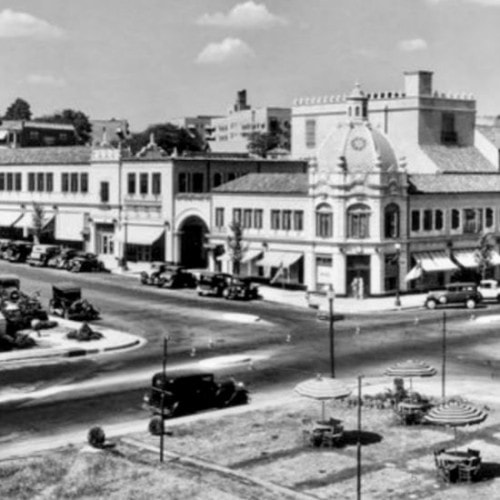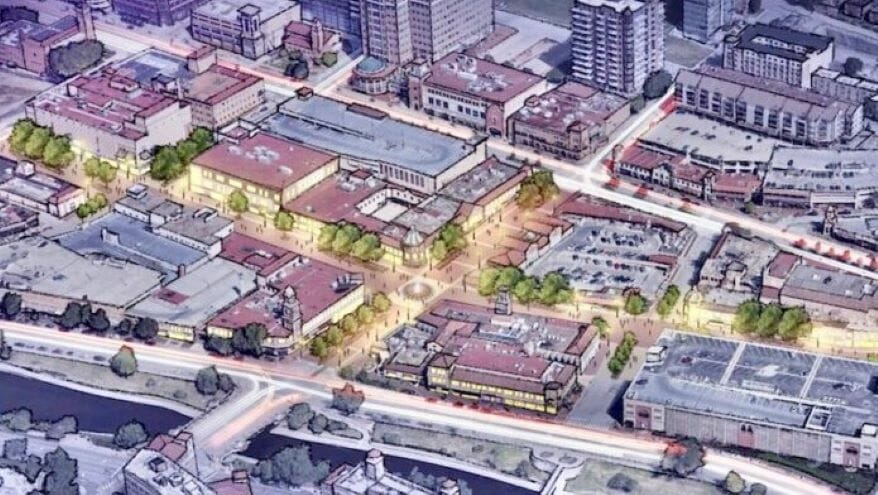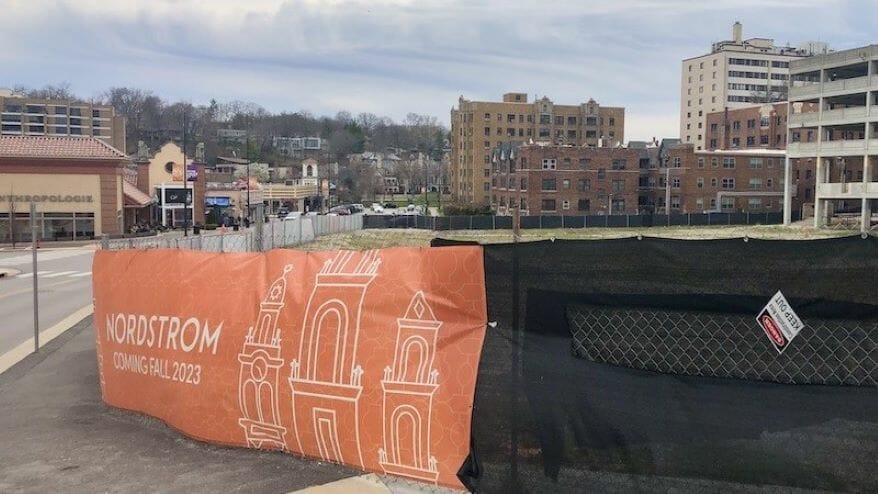Country Club Plaza Backers See Silver Lining in Loan Default Potential Change in Ownership Seen as a Positive Outcome
Published September 6th, 2023 at 10:31 AM
Above image credit: The Country Club Plaza remains one of Kansas City's most endearing landmarks. (Courtesy | Plaza Area Council)A loan default by the owners of the Country Club Plaza has lifted the hopes of Plaza advocates about the future of the venerable shopping district.
“For now, I am choosing to be optimistic that a new owner will bring new energy and abundant resources to the table and a new willingness to work with the city and the community,” said Kate Marshall, president of the Plaza District Council.
The decision by Macerich and Taubman to default on the $295 million loan in May, first reported last week by the Kansas City Business Journal, was the latest upheaval for a local landmark that many residents view as a public treasure as much as a private business.

In a statement issued on behalf of the Plaza ownership, Taylor Bunch of Fleishman Hillard said the internal financial problems won’t interfere with the major civic events planned there.
“We are in discussions with our lender, Nuveen, and are actively working toward a mutually acceptable outcome,” she wrote.
“In the meantime, we remain committed to the success of the Plaza and will continue to hold the Plaza’s beloved events, including the Art Fair and the Plaza Lights, while actively engaging with potential tenants to ensure the success of the district.”
Fretting about the Plaza has been a popular local conversation since at least 1998, when North Carolina-based Highwoods acquired J.C. Nichols Co., ending 75 years of local ownership.
Over the years, there has been continuing consternation as the once vaunted tenant mix that drew shoppers from around the Midwest — including such prestigious names as Saks Fifth Avenue, Bonwit Teller, Burberry and Hall’s — were lost.
A major flare-up occurred in 2010 when Highwoods proposed demolishing the Balcony Building, one of the Plaza’s original Spanish-style structures, to make way for an office building. The firm ultimately dropped the plan after a public outcry.
Social and public safety problems began to increase, mostly caused by unruly groups of teens during the summer. In 2011, Kansas City Mayor Sly James was pushed to the ground by his bodyguards in one shooting incident.

Just last weekend, a 15-year-old was shot during an altercation at 47th and Wyandotte streets. Two weeks ago, a store employee was wounded confronting a shoplifter. Two months ago, Shake Shack, a popular eatery, shortened its weekend hours because of ongoing fights.
Some local real estate professionals believe the Plaza’s current financial problems began when Taubman and Macerich bought the Plaza from Highwoods in 2016 for $660 million, a price they estimated was hundreds of millions of dollars more than it was worth.
The bricks-and-mortar retail industry in general already had been suffering from the rapid growth of online shopping. Then the COVID pandemic hit in 2020, further undermining retail sales.
Earlier this year, the Plaza owners challenged a $292 million valuation established by the County Board of Equalization in 2019, and the Missouri State Tax Commission agreed, knocking it down to $179.6 million.
Now, with a newly established tax valuation and a decision by the owners to default on their loan, some believe the conditions are right to move the Plaza past its current doldrums.
“Despite the recent news of the default, the Plaza is still the Plaza and will always be one of the top retail areas of Kansas City,” said Brandon Buckley, vice president of Lane4 Property Group. “We think it will emerge stronger on the back side.”

Lane4 is major local retail developer headquartered on the Plaza that recently revitalized the Red Bridge shopping center. Buckley said his firm is interested in pursuing an ownership interest in the Plaza depending on how the default process plays out.
Buckley said adding more local restaurants and retailers to the Plaza would help it regain its prominence.
“National retailers have a place, but you’d want to complete the mix with unique local operators,” he said.
Whether the current ownership survives, or some new entity takes over, they’ll still be faced with the big vacant lot on Jefferson Street that was to have been the home of a Nordstrom store.
The buildings previously at the location were demolished in 2019 to make way for what was to have been a 122,000-square-foot department store. That deal collapsed in 2022 and nothing has happened since then.

A tax-increment financing (TIF) agreement would have allowed the Plaza owners to retain some or all of the sales taxes and other revenues generated by the store to help finance the project.
Traditionally, department stores pay a substantially reduced rent at shopping centers because they serve as a magnet for customers to the entire development.
On the community front, the Plaza District Council was recently formed in response to concerns about the future of the iconic shopping district as it enters its next century.
Marshall believes a “new day is dawning” with the potential of fresh management.
“This has been coming for a while now, and I (believe) there are a number of entities that have been looking at what kind of opportunity may present itself,” she said.
David Westbrook, a respected local communications professional who’s been involved in organizing the Plaza District Council, said the group stands ready to assist potential new owners.
“Our civic leaders are even more passionate now about making sure the Plaza’s future is not only promising, but that an exciting new day will come,” he said.
While it’s uncertain whether the Plaza could return to local ownership, Westbrook observed that model was in place during the shopping district’s halcyon days.
“The Plaza has always been well served by truly local ownership and we want that possibility for the future,” he said.
“We want to assure any new owners that we will want to be partners.”
Flatland contributor Kevin Collison is the founder of CityScene KC, an online source for downtown news and issues.



